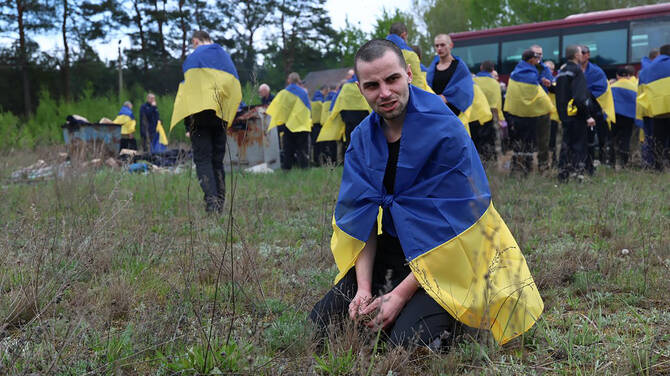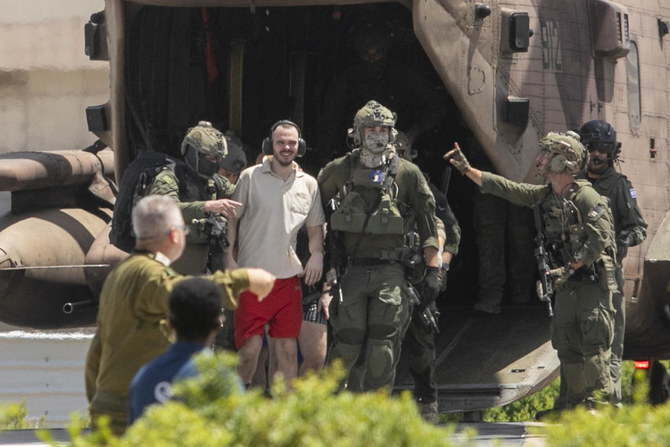CAIRO: Hamas said Saturday it will only release an American-Israeli and the bodies of four other hostages if Israel implements their ceasefire agreement, calling it an “exceptional deal” aimed at getting the truce back on track.
A senior Hamas official said long-delayed talks over the ceasefire’s second phase would need to begin the day of the release and last no longer than 50 days. Israel would also need to stop barring the entry of humanitarian aid and withdraw from a strategic corridor along Gaza’s border with Egypt.
Hamas would also demand the release of more Palestinian prisoners in exchange for hostages, said the official, who spoke on condition of anonymity to discuss the closed-door talks.
Edan Alexander, 21, who grew up in Tenafly, New Jersey, was abducted from his military base during Hamas’ Oct. 7, 2023, attack that ignited the war, and is the last living American citizen held in Gaza. Hamas still has a total of 59 hostages, 35 of whom are believed to be dead.
Two Israeli airstrikes in the northern town of Beit Lahiya near the border killed at least nine people, according to Gaza’s Health Ministry.
Fares Awad, a local health official, identified one of the dead as local reporter Mahmoud Islim, who was operating a drone.
The Israeli military said it struck two people operating a drone that it said posed a threat to soldiers in the area. It said it launched another strike at a group of people who came to collect the drone equipment. The army identified all of those targeted as suspected militants, without providing evidence.
There has been no major fighting since the ceasefire took hold on Jan. 19, but Israeli strikes have killed dozens of Palestinians who the military said had entered unauthorized areas, engaged in militant activities or otherwise violated the truce.
Israel has cast doubt on Hamas’ offer
There was no immediate comment on Hamas’ offer from Israel, where government offices were closed for the weekly Sabbath. Prime Minister Benjamin Netanyahu’s office on Friday accused Hamas of “psychological warfare” after the initial offer, before the militant group spelled out the conditions.
The United States said it presented on Wednesday a proposal to extend the ceasefire a few more weeks as the sides negotiate a permanent truce. It said Hamas was claiming flexibility in public while privately making “entirely impractical” demands.
Negotiations continued in Egypt after senior Hamas leader Khalil Al-Hayya arrived in Cairo on Friday. Egypt and Qatar served as key mediators with Hamas in reaching the ceasefire and have continued to host talks aimed at getting it back on track.
Under the ceasefire agreement reached in January, Israel and Hamas were to begin negotiations over a second phase — in which Hamas would release all the remaining hostages in exchange for a lasting truce — in early February, but so far only preparatory talks have been held.
After the first phase ended at the beginning of this month, Israel said it had agreed to a new US proposal in which Hamas would release half the remaining hostages in return for a vague commitment to negotiate a lasting ceasefire. Hamas rejected that offer, accusing Israel of backtracking on the signed agreement and trying to sabotage the truce.
Palestinian official says no fuel left for water wells
Israel has barred the delivery of food, fuel and other supplies to Gaza’s roughly 2 million Palestinians, and cut electricity to the territory, to pressure Hamas to accept the new proposal.
The city of Rafah, on the Gaza-Egypt border, said it could no longer provide fuel needed to pump water from dozens of wells across the city.
Ahmed Al-Sufi, head of the municipality, said fuel shortages caused by the Israeli siege have forced it to “suspend essential services, threatening the lives of thousands and exacerbating the health and environmental crisis.”
The first phase of the truce saw the release of 25 Israeli hostages and the bodies of eight more in exchange for nearly 2,000 Palestinian prisoners. Israeli forces pulled back to a buffer zone along Gaza’s border and allowed a surge of humanitarian aid.
An Israeli official said last month that Israel will not withdraw from the so-called Philadelphi corridor, along the Gaza-Egypt border, as called for in the ceasefire agreement. Israel has cited the need to combat weapons smuggling.
Hamas says it will only release American-Israeli hostage if truce agreement is implemented
https://arab.news/puxfj
Hamas says it will only release American-Israeli hostage if truce agreement is implemented

- A senior Hamas official said long-delayed talks over the ceasefire’s second phase would need to begin the day of the release and last no longer than 50 days
- Hamas would also demand the release of more Palestinian prisoners in exchange for hostages
Flights to and from Yemen’s Sanaa airport suspended following Israeli attack, director says

All flights to and from Yemen’s Sanaa International Airport have been suspended until further notice due to extensive damage following Israeli strike, the airport’s general director said on Wednesday in a post on X.
The Israeli military carried out an airstrike on Yemen’s main airport in Sanaa on Tuesday, its second attack in two days on Iran-aligned Houthis after a surge in tensions between the group and Israel.
Gaza rescuers say 31 killed in Israeli strikes on school sheltering displaced

GAZA CITY: Gaza’s civil defense agency said Wednesday that Israeli strikes on a school sheltering displaced people in the war-ravaged Palestinian territory killed 31 people and wounded dozens, with Israel saying it had targeted Hamas militants.
Gaza civil defense media officer Ahmad Radwan told AFP that a total of 31 people were killed and dozens more wounded in Israeli strikes “on a school sheltering displaced persons” in the Bureij refugee camp in the center of the Gaza Strip.
The Israeli military meanwhile said in a statement that its forces had struck a “Hamas command and control center in the central Gaza Strip” which was used “to store weapons.”
The strikes came as Israel drew international condemnation on Tuesday over its plans for an expanded Gaza offensive, as the country’s far-right finance minister called for the Palestinian territory to be “destroyed.”
Nearly all of Gaza’s 2.4 million people have been displaced at least once during the war, sparked by Hamas’s October 7, 2023 attack on Israel.
On Tuesday, Hamas dismissed as pointless ceasefire talks with Israel, accusing it of waging a “hunger war” on Gaza.
Israel’s military resumed its offensive on the Gaza Strip in March, ending a two-month truce that saw a surge in aid into the territory and the release of hostages in exchange for Palestinian prisoners held by Israel.
Gaza aid dries up as Israeli blockade enters a third month

- The current blockade has lasted longer than any previous Israeli halt in aid to Gaza since the Israel-Hamas war began
JERUSALEM: Israel has blockaded all entrances to the Gaza Strip since March.
While pummeling the strip with airstrikes, it has banned any food, water, shelter or medication from being trucked into the Palestinian territory, where the UN says the vast majority of the population is reliant on humanitarian aid to survive. Israel says the blockade aims to pressure Hamas to release the hostages it still holds. Of the 59 captives remaining in Gaza, 21 are believed to still be alive, US President Donald Trump said Tuesday, revealing that three had died.
Here’s a look at the humanitarian crisis spiraling in Gaza, through key statistics and charts:
The current blockade has lasted longer than any previous Israeli halt in aid to Gaza since the Israel-Hamas war began. Hamas attacked Israel on Oct. 7, 2023 and Israel froze aid to Gaza for two weeks.
Now, Gaza is entering its third month without supplies. Thousands of trucks queue along the border of the territory, waiting to be let in. Community kitchens are closing down and bakeries are running out of fuel. Families spend hours waiting in line for small portions of rice.
In their desperation, Palestinians have begun scavenging warehouses and stores for anything left. Aid groups report a rise in looting incidents over the last week. At least some have been looted by armed groups.
Meanwhile, Israel is moving forward with plans to seize all of Gaza and to stay in the Palestinian territory for an unspecified amount of time. It says it will expand operations there, defying calls for an immediate renewal of a ceasefire from families whose relatives are still held hostage in Gaza.
Israel’s offensive has displaced more than 90 percent of Gaza’s population and, Palestinian health officials say, killed more than 52,000 people, many of them women and children. Palestinian officials do not distinguish between combatants and civilians in their count.
UAE mediates deal for release of further 410 Russian and Ukrainian prisoners of war

- It is the 15th in a series of UAE-mediated prisoner-swap agreements that have resulted in the release of 4,181 captives in total
LONDON: The UAE has mediated the 15th in a series of agreements between Russia and Ukraine for the release of prisoners of war, as part of its ongoing diplomatic efforts to help resolve the conflict.
Under the latest prisoner-swap deal, 205 Ukrainians and 205 Russians were freed on Tuesday, the Emirates News Agency reported. The Emirati Ministry of Foreign Affairs said a total of 4,181 Russian and Ukrainian captives have now been released as a result of its mediation efforts, the continuing success of which reflects the level of trust Kyiv and Moscow have in the UAE.
The UAE remains determined to find a peaceful resolution to the war in Ukraine, which began in February 2022, and to help ease the humanitarian suffering it has caused, the ministry added.
Lebanon says one killed in Israeli strike on south

- The ministry said in a statement that the “Israeli enemy” strike on Kfar Rumman killed one person and wounded three others
- Israel has continued to launch regular strikes in Lebanon despite the November 27 truce
BEIRUT: Lebanon’s health ministry said an Israeli strike Tuesday on a car in the country’s south killed one person, the latest attack despite a fragile ceasefire between Hezbollah militants and Israel.
The ministry said in a statement that the “Israeli enemy” strike on Kfar Rumman killed one person and wounded three others.
Lebanon’s state-run National News Agency said the car was hit with a “guided missile” on the road linking the town of Kfar Rumman with the nearby city of Nabatieh.
There was no immediate comment from the Israeli military.
Israel has continued to launch regular strikes in Lebanon despite the November 27 truce which sought to halt more than a year of hostilities with Hezbollah including two months of all-out war, with a heavy Israeli bombing campaign and ground incursion.
Under the deal, Hezbollah was to pull its fighters north of Lebanon’s Litani River, some 30 kilometers (20 miles) from the Israeli border, and dismantle any remaining military infrastructure to its south.
Israel was to withdraw all its forces from south Lebanon, but it has kept troops in five positions that it deems “strategic.”
A Lebanese security source told AFP that Hezbollah had withdrawn fighters from south of the Litani and dismantled most of its military infrastructure in that area.
Lebanon says it has respected its commitments and has called on the international community to pressure Israel to end its attacks and withdraw from the five border positions.






















